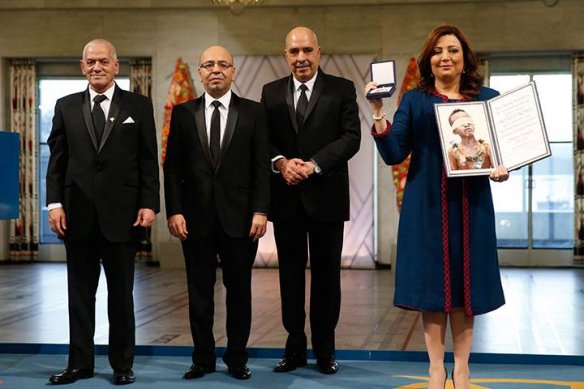
National Dialogue Quartet
Why did Tunisia succeed in reaching a compromise that led to democratic development, while other countries in the region have failed?
The answer does not lie in the large numbers of activists and demonstrators. There were also massive crowds protesting against the regimes in countries such as Egypt and Yemen. Nor is the answer an absence of Islamists. Islamist parties dominated in all the Arab countries.
Following the award of the Peace Prize, politicians and commentators have emphasized that the award shows the importance of “dialogue” and “compromise” in the building of strong democracies. But dialogue alone is insufficient. In Tunisia’s neighbour Egypt there were several attempts at national dialogue. The parties engaged in discussions, but never reached agreement.
An important reason for Tunisia’s success with national dialogue was that the organizations in charge had true popular legitimacy. The Tunisian people do not trust their politicians, but they trusted the trade union federation and the human rights campaigners and lawyers who engaged themselves in the struggle against tyranny. As the Nobel Committee itself writes, the Quartet is successful because, among other things, “the Quartet exercised its role as a mediator and driving force to advance peaceful democratic development in Tunisia with great moral authority”.
This legitimacy, or “moral authority”, was not something that the Quartet acquired overnight. The Tunisian General Labour Union (UGTT, Union Générale Tunisienne du Travail), which was the strongest participant in the Quartet with over half a million members, was founded in 1946 and played a central role in the struggle for independence from French colonial rule. In the decades following independence, the UGTT consolidated its position and today is considered the strongest and most representative organization in Tunisian civil society.
No equivalent organization existed in Egypt. Civil society there included a number of small NGOs without widespread popular support. The national trade union federation was an extension of the Mubarak regime and had no legitimacy. There were new, independent trade unions, but they had not had sufficient time to establish national significance. In other words, there were no strong organizations that had the trust of the Egyptian people. There was no one in a position to pressure the political parties to a compromise. The only organization that enjoyed the trust of the Egyptian people was the military, and it was the military that seized power in 2013.
The courses of events in Tunisia and Eqypt show that trade unions can have potential importance for democracy. Trade unions are often accused of being concerned only with “their own” interests, and for creating divisions rather than acting as unifying forces in times of transition. But the Tunisian example shows that trade unions have a key role to play in conflict resolution and democratic development. We know this from our experience in Norway, where a strong trade union movement has played an important role in the struggle for an inclusive democracy. Now the Arab Spring is teaching us the same lesson.
Accordingly it is important that this award of the Peace Prize is not interpreted primarily as supporting more “dialogue”. Unless there are organizations with popular legitimacy, dialogue is often a stillborn enterprise. The Peace Prize should instead be used as a lever to increase support for the establishment of strong civil societies and strong trade union movements as essential links for preventing conflict and building strong democracies worldwide.